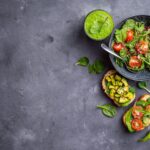Have you ever wondered, “What is orthorexia?” It’s a term that’s gaining attention, but many people are still unfamiliar with it.
Essentially, orthorexia nervosa goes beyond a simple desire to eat well; it represents an intense fixation on clean eating that can have significant implications for a person’s well-being.
In this comprehensive blog post, we’ll delve into the world of orthorexia nervosa to help you understand what it is, why it’s important to be aware of it, and how it can affect individuals.
We’ll explore the telltale signs of orthorexia, its underlying causes and provide insights into how you can offer support to someone struggling with this condition.
By the time you’ve finished reading, you’ll have a clear grasp of this lesser-known eating disorder, enabling you to recognize it and offer assistance to those in need.
What Is Orthorexia Nervosa?

Now, let’s unravel the concept of Orthorexia Nervosa. Orthorexia isn’t merely about pursuing a healthy diet; it’s a more extreme fixation that surpasses what most people consider a commitment to nutritious eating.
While it hasn’t been officially classified as an eating disorder in all diagnostic manuals, it is a real and growing concern.
Orthorexic individuals become overwhelmingly preoccupied with the quality and purity of the food they consume.
They may dedicate an excessive amount of time to researching, planning, and preparing their meals, all driven by an intense fear of deviating from their self-imposed dietary rules.
This fixation is distinct from the typical motivations of weight loss or body image improvement; it centers on an unwavering desire to consume what they believe is “perfectly healthy” food.
Understanding Orthorexia Nervosa is pivotal because it can easily be misconstrued as a dedicated commitment to a healthy lifestyle.
However, it can result in severe physical and emotional consequences, making it crucial to identify the signs and provide support to those grappling with this condition.
The Psychology Behind Orthorexia
The psychology behind Orthorexia Nervosa is a complex interplay of various factors that contribute to the development and perpetuation of this eating disorder.
At its core, Orthorexia is often rooted in psychological triggers, where individuals may grapple with feelings of perfectionism and an intense need for control over their food choices.
This disorder is characterized by an obsessive focus on consuming only what is perceived as healthy, with a relentless pursuit of an idealized diet.
The psychological aspects also involve anxiety and obsessive-compulsive traits, where individuals may find themselves preoccupied with thoughts about the purity and quality of their food.
This heightened concern often leads to rigid dietary restrictions and ritualistic behaviors, reflecting an overwhelming fear of deviating from self-imposed dietary standards.
Moreover, the influence of social media plays a pivotal role, fostering unrealistic ideals and contributing to the anxiety-inducing pressure to conform to prevailing health and wellness trends.
The impact on mental health cannot be overstated, as Orthorexia can lead to increased stress, anxiety, and a distorted sense of self-worth tied to adherence to a strict diet.
The intricate relationship between psychological factors and Orthorexia underscores the importance of addressing the underlying emotional aspects in the comprehensive understanding and treatment of this condition.
Symptoms Of Orthorexia Nervosa

Obsession With Healthy Eating
One of the most noticeable signs of Orthorexia Nervosa is a deep and relentless fixation on eating what they believe to be “healthy” foods.
Now, it’s perfectly okay to want to make nutritious food choices, but people dealing with Orthorexia take it to an extreme level. It’s like they’re on a constant quest for the purest and cleanest foods.
They might spend a lot of their time researching, planning, and preparing meals, and it often becomes an all-encompassing part of their daily life.
But here’s the thing, the focus isn’t on eating a balanced diet; it’s about reaching this almost impossible standard of what they consider “pure” eating.
Severe Dietary Restrictions
Another clear sign of Orthorexia is the strict and severe dietary rules they impose on themselves.
These rules often lead to cutting out entire food groups or specific items that they see as impure or unhealthy.
Imagine only eating a handful of foods because you’re terrified of anything else. This can result in some serious health problems because the body needs a variety of nutrients to work properly.
These extreme dietary restrictions can lead to malnutrition, severe weight loss, or other medical, which aren’t good for anyone.
Rigidity In Routine
A notable sign of Orthorexia Nervosa is the pronounced rigidity individuals exhibit in their daily routines, particularly in the context of meal planning and preparation.
Those affected often establish strict eating schedules and meticulously plan every aspect of their meals to align with their perceived standards of health. Any deviation from this routine can induce significant distress and anxiety.
This inflexibility extends beyond the realm of food, infiltrating other facets of their lives.
The obsession with maintaining their idealized lifestyle becomes all-encompassing, potentially hindering their ability to adapt to unexpected changes or engage in spontaneous activities.
This rigid adherence to routine underscores the profound impact that Orthorexia can have on an individual’s overall well-being, limiting their flexibility and enjoyment of life outside the confines of their meticulously planned meals.
Judgment Towards Others’ Eating Habits
Another revealing sign of Orthorexia Nervosa is the development of a judgmental attitude towards the eating habits of others.
Those struggling with Orthorexia may feel a sense of moral superiority regarding their dietary choices, perceiving their approach as the only virtuous or healthy way to eat.
This attitude often leads to unsolicited criticism and disdain for people who don’t conform to their stringent standards.
Such judgmental behavior can strain interpersonal relationships, creating an environment of tension and discomfort.
Friends and family may feel scrutinized and misunderstood, leading to social isolation for the individual with Orthorexia.
This aspect of the disorder emphasizes the need for a holistic approach to recovery, addressing not only the individual’s relationship with food but also the impact of their attitudes on social dynamics and connections with others.
Preoccupation With Food Purity
People with Orthorexia Nervosa become overly preoccupied with the quality and purity of the foods they eat.
They might become food detectives, reading labels, researching ingredient sources, and constantly questioning the origins of their food.
They become fearful of consuming anything they perceive as “impure” or “unhealthy.” This obsession with food purity can make mealtime a stressful experience, taking away the joy of eating and making it more like a complicated puzzle to solve.
Guilt And Anxiety About Food Choices
Finally, there’s a constant cloud of guilt and anxiety hanging over those with Orthorexia when it comes to food choices.
If they make even a tiny slip-up or deviate from their strict dietary rules, it can feel like a major failure.
This emotional turmoil can be all-consuming, causing them to dwell on perceived dietary mistakes.
In some cases, they might try to “undo” these mistakes by engaging in behaviors like excessive exercise or fasting. It’s a never-ending cycle of guilt and anxiety related to food.
Causes Of Orthorexia Nervosa

Psychological Factors
Think of orthorexia as a condition where people become super focused on eating healthy foods.
This often happens because they want to be in control and make everything perfect in their lives.
They might feel a lot of stress and can’t stop thinking about what they eat.
Sometimes, they believe that if they eat perfectly, they’ll look better and feel better about themselves. It’s like they’re trying to be perfect through their food choices.
This all happens because they have high standards for themselves, and sometimes, they worry a lot or can’t stop doing certain things (like checking food labels all the time).
Also, they might not feel very good about how they look, and they hope that eating perfectly will change that.
Sociocultural Factors
In today’s digital age, social media exerts a powerful influence on our perceptions of health and dietary choices.
Recent research reveals that platforms like Instagram and TikTok play a substantial role in shaping our ideas about what it means to eat healthily.
Influencers and celebrities often share their daily diets and exercise routines, promoting highly restrictive eating patterns as the key to achieving their seemingly perfect bodies.
As we repeatedly encounter these images and diets, it’s easy to believe that extreme dietary measures are necessary for good health.
Furthermore, in societies where a particular body type is highly prized, the pressure to conform to these beauty ideals is amplified through social media.
People who spend more time on these platforms are more likely to compare themselves to others and feel compelled to meet these unrealistic standards, potentially leading to orthorexic tendencies.
Thus, social media’s impact is a substantial sociocultural factor that can drive individuals toward orthorexia, underscoring the importance of being discerning consumers of online content.
Environmental Factors
Sometimes, the way we grow up and the people we’re around can make us eat a certain way. If your family always eats really healthy, you might start doing that too.
Or if your friends talk a lot about eating perfectly, you might want to do it as well. Also, when we can easily find information about health and diets in books, magazines, or online, it can make us want to try those diets, even if they’re very strict.
We might not know the problems it can cause because we have so much information available.
So, the place you live and the people you know can make you eat super healthy without even realizing it.
Life Events And Trauma
Sometimes, when we go through hard times in life or something really sad happens, we might turn to certain ways of eating to feel better. It’s like a way to make things feel normal again.
Stress or tough events can make people start eating very strictly because it makes them feel like they’re in control. It’s a bit like a security blanket for them.
So, when something really tough happens, it can lead to eating super healthy as a way to cope and try to feel better.
Understanding how tough times can lead to eating this way helps us see that it’s not just about food; it’s about feelings and trying to feel okay again.
Physical Health Effects

Nutritional Imbalances
What is orthorexia’s impact on nutrition? Orthorexic individuals often limit themselves to a narrow range of “clean” or “pure” foods, excluding entire food groups, which can result in nutrient deficiencies.
For example, eliminating dairy products may lead to insufficient calcium intake, potentially affecting bone health.
Similarly, excluding grains could result in a shortage of essential carbohydrates needed for energy.
Impact On Physical Well-Being
Orthorexia can manifest in various physical symptoms, including fatigue, weakness, and muscle loss. When the body doesn’t receive a balanced intake of nutrients, it may struggle to function optimally.
This can lead to physical discomfort, hindered immune function, and even disruptions in menstruation for some individuals.
Understanding the toll Orthorexia Nervosa takes on the body’s physical well-being highlights the importance of seeking help for this condition.
Coexisting Medical Conditions
Orthorexia often coexists with other medical conditions, compounding its physical impact.
For instance, individuals with pre-existing health issues such as irritable bowel syndrome (IBS) or celiac disease may develop more severe symptoms due to their rigid dietary restrictions.
It’s crucial to recognize that Orthorexia Nervosa can exacerbate existing health conditions, making early intervention essential for both physical and mental well-being.
Social And Emotional Impact
Impact On Relationships
Orthorexia Nervosa can significantly strain personal relationships as individuals grappling with this condition often find themselves preoccupied with strict dietary rules.
Friends and family may feel confused or excluded when social gatherings and meals become challenging due to the rigid dietary preferences associated with Orthorexia.
The person with Orthorexia might withdraw from shared activities involving food, causing strain on bonds that once thrived on shared experiences, including meals.
This distancing effect can lead to feelings of isolation and frustration among loved ones, as communication becomes centered around food restrictions rather than the emotional connection that sustains healthy relationships.
Social Isolation
One of the distinctive features of Orthorexia Nervosa is the gradual withdrawal from social events that involve food, which can lead to social isolation.
Individuals may choose to avoid gatherings or outings where they perceive they cannot strictly adhere to their dietary principles.
This self-imposed isolation can foster feelings of loneliness and detachment from social circles, exacerbating the emotional toll of Orthorexia Nervosa.
The fear of encountering “unhealthy” food options in social settings can create a barrier, preventing those with Orthorexia Nervosa from fully participating in the broader social fabric.
Over time, this isolation can intensify, contributing to a cycle where the individual becomes increasingly detached from supportive social networks.
Emotional Toll
Orthorexia Nervosa takes a profound emotional toll on individuals, impacting their overall well-being.
The relentless pursuit of a perfect and pure diet can lead to heightened levels of anxiety and guilt surrounding food choices.
Emotional distress often accompanies any perceived deviation from strict dietary guidelines, reinforcing a cycle of negative emotions.
This constant internal battle can lead to a diminished quality of life, as the emotional toll extends beyond the realm of food into daily activities.
The emotional strain may manifest as mood swings, irritability, and a general sense of unease.
The preoccupation with food quality and purity becomes a dominating force, overshadowing the joy and spontaneity that should accompany a healthy relationship with food and life in general.
Addressing the emotional aspects of Orthorexia Nervosa is crucial for a comprehensive approach to recovery, emphasizing not only physical health but also the restoration of emotional well-being.
Treatment And Recovery
Approaches To Treatment
When it comes to dealing with Orthorexia Nervosa, there are various approaches that can help. First and foremost, it’s crucial to understand that recovery is possible.
Treatment often involves a combination of therapies, such as cognitive-behavioral therapy (CBT), which helps individuals change harmful thought patterns related to food and body image.
Additionally, psychoeducation plays a vital role in treatment, where individuals learn about what Orthorexia Nervosa is and its impact on their lives.
Nutritional counseling is also a key component, in helping individuals establish a balanced and healthy relationship with food.
Support groups can provide a sense of community, allowing people to share their experiences and learn from others who’ve faced similar challenges.
Ultimately, the goal of treatment is to help individuals regain a healthy perspective on food and their bodies.
Building A Support System
Battling Orthorexia often feels less daunting when you have a strong support system. Friends and family can play a crucial role in the recovery process.
They may not fully understand what Orthorexia Nervosa is at first, but educating them about the condition can help them provide better support.
Open and honest communication is key; it’s important for loved ones to listen without judgment.
Professionals like therapists, nutritionists, and medical doctors can also be a part of your support team.
They can provide guidance, monitor your progress, and ensure your physical and mental health are on the right track.
Remember, recovery is a journey, and having people who care about your well-being can make all the difference.
Recovery Journey
The journey toward recovery from Orthorexia Nervosa is unique for each person. It’s a process of self-discovery and healing.
To start, it’s important to acknowledge that recovery is possible and that you deserve to live a life free from the constraints of Orthorexia nervosa.
Along the way, you may encounter ups and downs, and that’s okay. Celebrate your victories, no matter how small they may seem, and be compassionate with yourself during setbacks.
Keep in mind that what is orthorexia nervosa and what you’re experiencing is treatable. Set realistic goals and take one step at a time.
As you progress, you’ll gradually develop a healthier relationship with food, your body, and yourself.
The journey may be challenging, but it’s a path towards a more balanced and fulfilling life.
Final Thoughts
Understanding what orthorexia is and the nuances of Orthorexia Nervosa is vital in today’s health-conscious world.
By recognizing the complexities behind orthorexia nervosa, we can foster empathy and support for those affected.
Remember, the journey to recovery is possible, and spreading awareness about Orthorexia Nervosa can make a significant difference in the lives of individuals who may be struggling silently.
Let’s encourage balanced eating habits and promote a healthy relationship with food, ensuring that wellness is achieved through both physical and emotional well-being.













